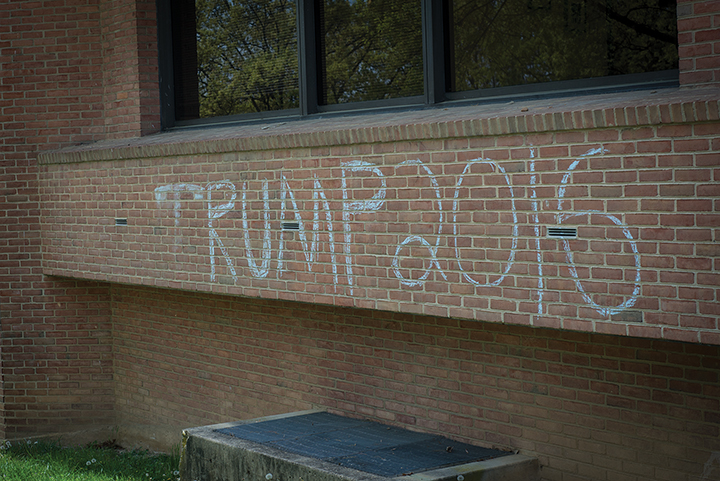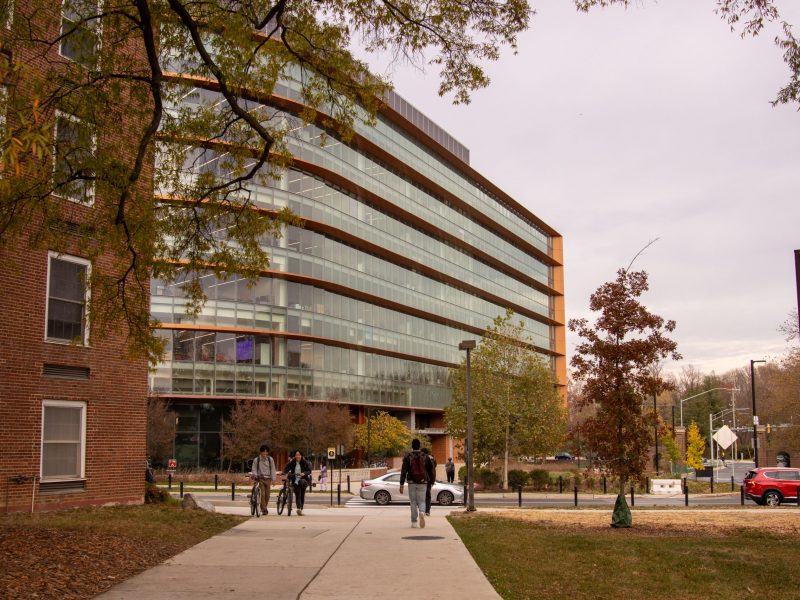By Naomi Grant and Josh Magness
With chalk in hand, University of Maryland students assembled before Hornbake Library one night this semester with a single goal in mind: to spread the word about presidential candidate Donald Trump. Among those students — who were members of Terps for Trump, an on-campus advocacy group for the Republican front-runner — was freshman computer engineering major Shubham Chattopadhyay.
Chattopadhyay, a first-generation immigrant from India, who has been a member of the organization since its founding early March, said he was working on a chalk design when three white men approached the group. The trio began to call the Trump supporters racist, he said, and soon started to confront Chattopadhyay as well.
“They saw me and they told me that I don’t know what’s good for me,” said Chattopadhyay, who received his U.S. citizenship last year. “I honestly considered being like, ‘Are you being racist against me by saying that I, myself, as a non-white person, don’t know better? Who are you to tell me what to do?'”
Chattopadhyay, who considers himself a “classical liberal,” started out as a supporter of Democratic candidate Jim Webb. When Webb dropped out of the race, Chattopadhyay said he spent a month and a half researching the policies of the remaining candidates.
He couldn’t support Hillary Clinton, he said, because she would just be another four years of President Obama, who left a “bad taste in [his] mouth.” Sen. Bernie Sanders wasn’t the candidate for him, either, because of his Democratic socialist policies, such as creating a universal healthcare system and free tuition at public universities.
Ted Cruz also wasn’t a suitable option, as Chattopadhyay, who believes in the separation of church and state, said he disagrees with the Texas senator on the role of religion in government.
That left only one viable candidate for the politically-minded freshman: Donald Trump.
A few months after selecting his candidate, some of Chattopadhyay’s friends approached him to gauge if he would be interested in joining a ‘Terps for Trump’ group. Chattopadhyay quickly agreed and is now one of the nearly-20 active members of the growing advocacy group.
So far, members have mostly spread awareness about Terps for Trump through chalking in front of locations like Stamp Student Union and, more recently, participating in a debate against Terps for Bernie, another student advocacy group, on April 15. The group is searching for a faculty advisor with hopes of becoming a recognized SGA student organization soon, said President Matt Morris, a sophomore mechanical engineering major.
At first, Morris said, people would be shocked when he revealed his ardent support of the New York businessman. But all that has changed after his group began chalking throughout campus.
“Now I think after we have done the chalking and got out there as a group a little bit, it’s become a bit more normalized and they go, ‘Oh, you’re one of the Trump kids,'” Morris said.
While chalking has proven to be an effective recruitment tool, showing support for Trump has also been a controversial topic among some students, said sophomore and Terps for Trump member Nicholas Zielinski.
“The whole chalking thing I really liked– I love seeing how it spread,” said Zielinski, a fire protection engineering major. “There’s so many people complaining about it, but they’re being shown that free speech is alive. If they want to erase it, that’s fine, but … we’re allowed to say what we want without being attackedfor it.”
Morris said concerns among group members about students’ reactions are not uncommon. All the group asks for, he said, is free and open dialogue, even when people disagree.
“We have a lot of struggles, [and] we’re afraid of being harassed,” Morris said. “We want our views to be respected [and to] share them with people who care. Some people want to shut that down, and they think that us advertising is harassment.”
But being a Trump supporter isn’t all that bad for freshman government and politics major Ben Dean.
“I’ve been a Trump supporter since he first announced it,” Dean said. “Over the summer, my Tinder profile said ‘Donny Trump, 2016.’ You get a lot of people who don’t like you, but I feel like it’s a good way to weed those people out.”
Joining Terps for Trump does not necessarily mean you support all of the GOP front-runner’s positions, either, Chattopadhyay said. He added that he supports gay marriage and considers himself pro-choice, but that our country faces more pressing issues that Trump can address.
“African Americans have rights, women have rights, gay people have rights now and everything, so that’s not really something we need to worry about,” he said. “We can talk about social issues all we want but that doesn’t fix everything that is happening in the outside world. If we don’t have a country to fix, then there is no point in talking about these small things.”
Members of Terps for Trump aren’t necessarily looking to convert the entire campus into Trump supporters; they simply want others to see their views as valid.
“I just want to be able to say I support Donald Trump, and I don’t want to get attacked or yelled at,” said freshman aerospace engineering major Mukund Patnaik. “I want people to view Trump as a normal person like any other presidential candidate.”
Even though Chattopadhyay wants people to cast their votes for Trump, he said he’s fine that other people have arrived at different decisions through their own research. Being able to interact with those with differing opinions, he said, is a crucial part of political discourse.
“Even if you disagree with someone, you still need to talk about the issues in case you are wrong,” he said. “There is always a chance that you are wrong and you need to be able to talk about it, too.”



